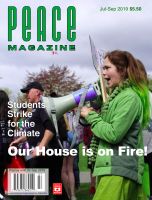
Peace Magazine Jul-Sep 2019, page 26. Some rights reserved.
Search for other articles by Derek Paul here
A conference in Basel, Switzerland 12-13 April 20191
This innovative conference was a particularly encouraging experience. New avenues for discouraging armaments- even nuclear weapons -were introduced, and a most impressive assembly of invited participants was present. It would be hard to determine whether listening to the speakers or interacting with them between and after sessions was the more valuable. Two German ex-parliamentarians and one from Norway were present, as well as Margaret Kiener Nellen, MP in the Swiss National Council, and Fabian Hamilton, British MP for Leeds North since 1997; and many others, including activists, from a great variety of backgrounds. One needed time to get to know them all, which sadly was not possible in the 28-hour span of the event. Also, significant others came simply to listen to the proceedings and interact with other participants.
The conference advanced two key tools:
The official conference report1 speaks very well for itself and for the speakers, though any emphasis was of course that of its writers. In this sense, the conference deserves some additional comment on the specifics of divestment.
One can divest for more than one reason. Divestment is important for reasons of conscience, and it can be important strategically. A talk by Chayley Collis, a Quaker from Huddersfield, England, was an example of the former. By contrast, the paper by Rudolf Rechsteiner, President of the Ethos Foundation, dealt with the strategic aspects of divestment. Rechsteiner’s investigation of the effects of divestment-where it might succeed, or is unlikely to do so, and why-was for me the highlight of the conference. His power point presentation is available on the conference website,2 which includes some of the talks by other speakers.
Other outstanding presentations were by Robert Smith, Jürgen Grässlin, and Bärbel Höhn, to mention only three. Höhn’s activism for the Green Party in Germany includes many successes both within and outside of parliament.
I felt that the conference was a meeting of fine heads, with most excellent personal successes in the trend to make the world economy more sustainable and less militaristic. But almost all are people immersed in the present, traditional economy, in which money or its absence determines what happens. And that is not unreasonable, because it is the status quo. But I remember the words of economist Mary Kaldor in 1981, when she said “You will never get disarmament as long as we have the current form of economy.”3
It took me years to learn that lesson, but, today, nobody could be more convinced than I am of the truth of what she said. The traditional economy demands arms manufacture, because it doesn’t include a healthy ecosphere as part of its domain and, without arms manufacture, one cannot maximize production and the throughput of raw materials from extraction to their final resting place-a constant economic objective.
I intervened after Alyn Ware’s paper, the last in the conference. Alyn had said how good it would be to have the money now used for military production in order to carry out peaceful programs for addressing climate change and achieving sustainability-a sentiment that has been expressed often enough, but which is usually based upon the false assumption that money is a conserved quantity. I pointed out that addressing climate change is so urgent that we must not wait until military budgets decline hugely. The necessary funds must be produced by new means, such as issuance of new money from publicly-owned banks at zero interest.
Derek Paul is a retired Toronto physicist, now based in Montréal.
1 The official conference report can be read at: www.nuclearweaponsmoney.org/news basel-city-hosts-successful-conference-on-move-the-nuclear-weapons-money/
2 See the conference website (working documents, presentations, and other material) at www.nuclearweaponsmoney.org/basel-conference-2019.
3 Mary Kaldor, economist, is the daughter of the late Lord Kaldor, who succeeded Keynes at Cambridge and completed the voluminous work started by Keynes. Mary was a researcher at the Stockholm International Peace Research Institute in its early days, and is today well known for her publications and her influence in British politics.

Peace Magazine Jul-Sep 2019, page 26. Some rights reserved.
Search for other articles by Derek Paul here